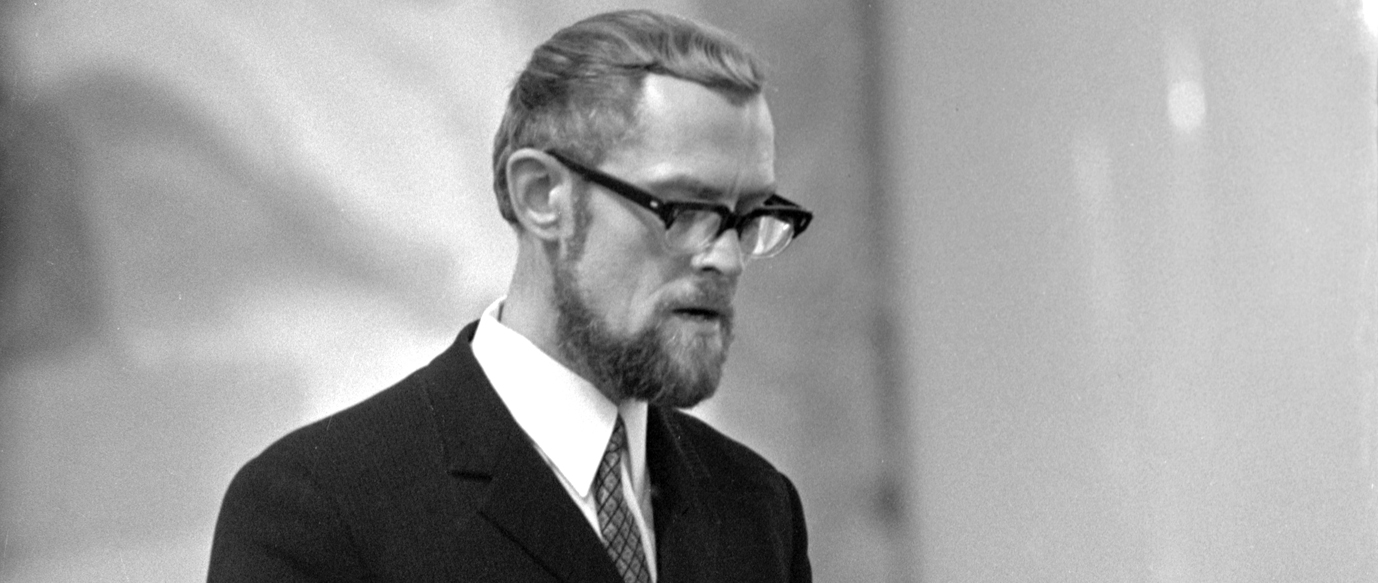With the suppression of the breakthrough in modern literature in 1972, literary life entered a gray period. An oppressive, stifling atmosphere shackled both private and public life.
But it was also a time when the government began changing its tactics to deal with inconvenient persons. Many artists and cultural figures were sent to psychiatric hospitals for "treatment", while others died under strange circumstances (linguist Jonas Kazlauskas, Raimundas Samulevičius, Mindaugas Tomonis), and many others committed suicide (Bronius Radzevičius) or tried to emigrate, which was nearly impossible at the time. Yet a few succeeded: political scientist and philosopher Aleksandras Štromas emigrated in 1973, prose writer Icchokas Meras in 1974, theater director Jonas Jurašas and literary translator Aušra Marija Sluckaitė in 1974, artist Vladislovas Žilius in 1976, poet and literary translator Tomas Venclova in 1977, artist Algimantas Švėgžda in 1976, followed by the poet Edita Nazaraitė in 1984 and prose writer Saulius Tomas Kondrotas in 1986.
Public life became dominated by conformism, government harassment and a hunt for all types of scarce "deficit" goods – from apartments to automobiles to shoes, clothes... Marcelijus Martinaitis wrote in his journal at the time about the destruction of human dignity, the deprivation of liberty and the transformation of man into a type of social function.
When has human life been so stunted and the human soul so numbed? Thousands, full of vodka up to their eyes, become animals. Who cares about generosity, honor or the matters of the spirit? Even art is deprived of this most timeless of rights. Artists are turned into the same wallowing rubbish, their conscious suppressed, persecuted by anonymous, well-groomed punks. Who sees and understands this filth? Who feels the decline of humanity? Who will answer for it, and from where? The new sergeants of culture promote only those who are blind to all this or who pretend not to see it. Everything else is persecuted according to the principle embraced by tyrants and conquerors: gouge out the eyes of any witnesses who see any of this. Marcelijus Martinaitis, Tylintys tekstai: Užrašai iš raudonojo sąsiuvinio, 1971-2001, Vilnius: Lietuvos rašytojų sąjungos leidykla, 2006, p. 34.
Authors of modern literature are excluded and silenced (Sigtas Geda even loses his position on the editorial board of Mūsų gamta (Our Nature)). The dissertation defense of Vytautas Kubilius, one of the most talented literary critics and a defender of an author's individual talents and subjectivity, is suspended. Fears are expressed among literary critics about stabilization, a new discussion arises about finding a balance between experimental works and the classics, while, behind closed doors, they complain about a lack of interesting manuscripts. During planning of their 1976 schedule, the entire editorial board at the "Vaga" publishing house deplores the complete absence of original Lithuanian literary works, especially novels and short stories. Authors become reticent to submit manuscripts.
Cultural life shifts, in part, to the underground press. The Chronicle of the Lithuanian Catholic Church first appears in 1972, followed by other, mostly religious, underground publications that sometimes provided a venue for the publication of literature.
Yet literary officialdom speaks in relieved tones about a newly achieved balance between innovation and tradition. Generally, they began speaking a lot and everywhere: in gatherings, meetings, conferences. Resolutions repeating empty phrases and anonymous speeches – nothing more than vacuous fronts of an entrenched bureaucracy – abound.
From a recording of Martinaitis made in 1979:
Imperial agony? In every field we see stagnation, sluggishness, laziness, bureaucratic imbecility and senile wasting, all accompanied by the feverish activity of repressive government structures, and the terrible uncertainty and suspicion they provoke. We can feel some sort of hidden force, a threat on the verge of eruption. And who knows which will win out: the dark, brutal and blind Russian slavish instinct pining for a more traditional patriarchal force, or renewal and spiritual purification?
Cynicism is now out in the open. It no longer hides behind morality, or Marxism, or the idea of a brighter future. All of that is finished. One may not be exactly afraid to live – there is no direct threat of physical destruction or open terror. But, even so, to live is becoming a dirty thing. Marcelijus Martinaitis, Tylintys tekstai: Užrašai iš raudonojo sąsiuvinio, 1971-2001, Vilnius: Lietuvos rašytojų sąjungos leidykla, 2006, p. 111.




Comments
Write a comment